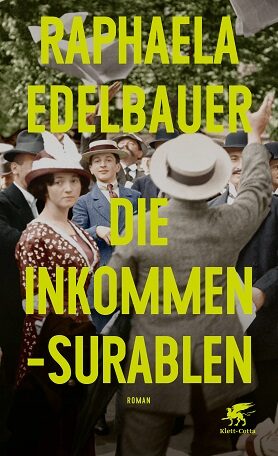Raphaela Edelbauer
Die Inkommensurablen
[The incommensurables]
- Klett-Cotta Verlag
- Stuttgart 2023
- ISBN 978-3-608-98647-1
- 352 Pages
- Publisher’s contact details
Published in Italian with a grant from Litrix.de.
Sample translations
The bourgeois world on the edge of a precipice – then and now
In his famous novel Mann ohne Eigenschaften (‘Man without properties’), the great Habsburg writer Robert Musil was troubled by one phenomenon in particular: the supremacy of literature as the key means of interpreting the world was under threat from the sciences, mathematics and psychoanalysis. Musil therefore ventured to undertake a massive experiment in his novel by attempting a crazy but brilliant analysis of the situation in Vienna on the eve of the outbreak of the First World War – and to do so in full consciousness of the situation looming in the 1930s, when there were already ample harbingers of a second World War. His ‘Man without Properties’ both referenced and undermined the discourses current at his time – whilst also being way ahead of them.
Raphaela Edelbauer has now undertaken a parallel venture – but in furioso style. Following Musil’s example she has put 1 August 1914, the day of Germany’s declaration of war, at the heart of her novel, and taken on the task of replicating Musil’s argumentation aiming to show what literature can nonetheless achieve - applying it to exactly the same subject matter, but in the circumstances of today. After fleeing from his farm-labourer job in the Tyrol, Hans arrives almost destitute in Vienna. All he has in his pockets is the address of a psychoanalyst called Helene Cheresch from whom he hopes to get treatment. However, this surface plotline is essentially a merely decorative cover for much murkier processes going on beneath the surface. Having acquired two friends as though in a trance, Hans goes on to spend the following twenty-four hours with them – the mysterious Anna, and Adam, the rich scion of an aristocratic family. The reader witnesses a rehearsal of Arnold Schönberg’s second string quartet - in its day the object of much scandal; a supper in Adam’s conservative but elegant family home; and then a nocturnal orgiastic foray through Vienna’s demi-monde and underworld.
On this day of unbridled enthusiasm for war the three protagonists of the novel are plainly ‘incommensurables’, as announced programmatically in the book’s title - a portentous word that instantly transports us into the aesthetic cosmos of Robert Musil. In Edelbauer’s world, however, ‘The Incommensurables’ could almost be the name of an avant-garde pop band. Furthermore ‘Incommensurables’ is also the title of the disquisition Klara presents on irrational numbers in her doctoral viva voce exam.
Raphaela Edelbauer thus works in the same essayistic realm that Robert Musil envisaged for his novel. At a certain point – which is crucially important, especially for a writer – the exact sciences cross over into the realm of imagination.
And the author gives proof here that the imaginative realm is the absolutely right and proper domain of literature. She constantly shifts the boundaries between dream and reality and, without at any point identifying concrete correlations with current events, throws light on the opening day of the war – which symbolically encapsulates the nature of bourgeois society – as something that is epistemically of real interest to us today. How does the manipulation of a populus work? And what is our own stance in regard to it?
Events follow one another thick and fast in this novel. The fact that Hans, Klara and Adam all have very distinctive temperaments and entertain unusual visions of existence plays an important part in the shaping of the narrative. There are dream sequences that include thriller-like elements; the big showdown occurs out in the countryside, in a village that is summoned up in a purely visionary manner during the course of the story and then abruptly deconstructed; there are no certainties. Following their experience of the First World War, and in the face of fascism, many writers and intellectuals of the time were deeply troubled by the phenomenon of mass suggestion. In her dazzling novel Raphaela Edelbauer relates this to the present era, to new modes of manipulating people’s consciousness. The ‘incommensurables’ tell us that we know everything – but whatever that may be, it isn’t enough.
Translated by John Reddick

By Helmut Böttiger
Helmut Böttiger, born 1956 in Creglingen, studied German Literature and History. After serving for several years as Literary Editor of the Frankfurter Rundschau, he is now a freelance author, columnist and literary critic and lives in Berlin.
(Updated: 2020)
Publisher's Summary
Vienna, the heart of the Austro-Hungarian monarchy, is in turmoil. Only another thirty-six hours and the German ultimatum will expire. The entire city is in a state of flux, the younger generation’s enthusiasm for war is boiling over on every street corner. It is this frenzy that greets Hans, a groom from the Tyrol, who has made his way to the metropolis in search of Helene Cheresch, a psychoanalyst. Having found her he immediately encounters Adam, an artistically gifted aristocrat, and Klara, who is set on becoming one of the first women ever to gain a doctorate in Mathematics at Vienna University. The three young people spend the final evening before General Mobilisation together - in a city that increasingly threatens to leave them floundering.
(Text: Klett-Cotta Verlag)
